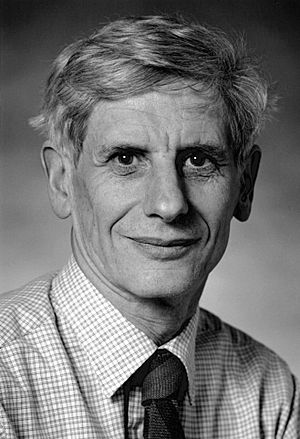David J. Thouless facts for kids
Quick facts for kids
David Thouless
|
|
|---|---|

David Thouless in 1995
|
|
| Born |
David James Thouless
21 September 1934 Bearsden, Scotland
|
| Died | 6 April 2019 (aged 84) Cambridge, England
|
| Nationality | British |
| Citizenship | United Kingdom |
| Alma mater |
|
| Known for |
|
| Spouse(s) |
Margaret Elizabeth Scrase
(m. 1958) |
| Children | Three |
| Awards |
|
| Scientific career | |
| Fields | Condensed matter physics |
| Institutions | |
| Thesis | The application of perturbation methods to the theory of nuclear matter (1958) |
| Doctoral advisor | Hans Bethe |
| Notable students | J. Michael Kosterlitz (postdoc) |
David James Thouless (born 21 September 1934 – died 6 April 2019) was a British physicist. He studied how materials behave at a very tiny level. This field is called condensed-matter physics.
He won the Wolf Prize in 1990. In 2016, he shared the Nobel Prize in Physics. He won it with F. Duncan M. Haldane and J. Michael Kosterlitz. They were honored for their discoveries about strange states of matter. These discoveries involved something called "topological phases."
Early Life and School
David Thouless was born on 21 September 1934. His birthplace was Bearsden, Scotland. His parents were English. His mother, Priscilla Thouless, taught English. His father, Robert Thouless, was a psychologist.
David went to Winchester College for his early education. He then studied Natural Sciences at the University of Cambridge. He earned his first degree there. Later, he went to Cornell University in the United States. He earned his PhD, which is a very advanced degree, with Hans Bethe as his advisor.
Career and Discoveries
After finishing his studies, David Thouless worked at several universities. He was a researcher at Lawrence Berkeley Laboratory. He also taught physics at the University of California, Berkeley.
From 1961 to 1965, he worked at Churchill College, Cambridge. He was the first director of physics studies there. Then, he became a professor at the University of Birmingham in the UK. This was from 1965 to 1978. He also taught at Yale University for a short time. In 1980, he became a physics professor at the University of Washington in Seattle.
Thouless made many important discoveries. He studied how large groups of atoms and electrons behave. He also looked at how particles inside atomic nuclei work. His research helped us understand superconductivity. This is when materials can conduct electricity with no resistance. He also studied how nuclei move and change.
He greatly helped us understand "many-body problems." These are problems involving many tiny particles interacting. For atomic nuclei, he explained "rearrangement energy." He also found a way to calculate how deformed nuclei spin. He also introduced the idea of "topological ordering" in materials. This is a special way that particles can arrange themselves.
Awards and Honors
David Thouless received many awards for his work. In 1979, he became a Fellow of the Royal Society (FRS). This is a very high honor for scientists in the UK. He also became a Fellow of the American Physical Society in 1986.
He was also a member of the US National Academy of Sciences. This is a group of top scientists in the United States. He won the Wolf Prize for Physics in 1990. In 1993, he received the Paul Dirac Medal.
One of his biggest awards was the Nobel Prize in Physics in 2016. He shared this prize for his groundbreaking work on topological phases of matter.
Personal Life
David Thouless married Margaret Elizabeth Scrase in 1958. They had three children together. He passed away on 6 April 2019 in Cambridge, England, at the age of 84.
See also
- Hofstadter's butterfly
- Single-electron transistor
 In Spanish: David J. Thouless para niños
In Spanish: David J. Thouless para niños
 | John T. Biggers |
 | Thomas Blackshear |
 | Mark Bradford |
 | Beverly Buchanan |

